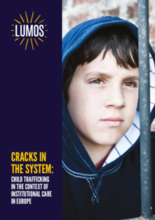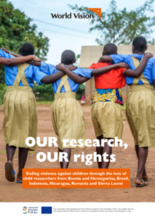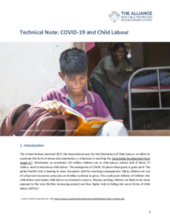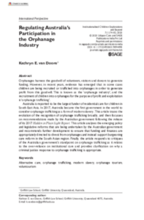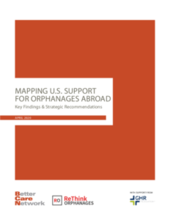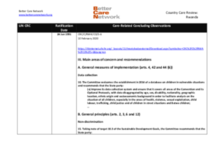Displaying 101 - 110 of 469
Cracks in the System is a new report from Lumos that is the first of its kind to systematically explore the links between institutional care and child trafficking in Europe.
In this episode of the Protected! Podcast, Hani Mansourian from the Alliance for Child Protection in Humanitarian Action talks to Selim Benaissa, Chief Technical Officer from the ILO on the Myanmar program for the elimination of child labour about how the coronavirus pandemic has affected the program.
This child-led research initiative was conducted under the umbrella of World Vision’s DEAR project (Development Education and Awareness Raising) and the Sustainable Development Agenda 2030. The study explores explore SDG 16.2, the goal that focuses on the issue of ‘abuse, exploitation, trafficking, and all forms of violence against and torture of children’.
This technical note offers guidance and information to practitioners and policy-makers on child labour issues during and after COVID-19 and what actions can be taken.
This animated video from Alternative Care Thailand tells the story of a boy in Thailand who is sent to live in an orphanage because his mother feels she is unable to care for him at home, his experiences with volunteers once he arrives at the orphanage, and how the orphanage transitioned to supporting children to live in families.
This article traces the evolution of the recognition of orphanage trafficking broadly, and then focusses on recommendations made by the Australian government following the release of its 2017 Hidden in Plain Sight Report.
This report lays out the results of a preliminary mapping exercise to document the ways in which the United States supports and perpetuates overseas orphanages. It is based on: an analysis of existing data; a literature review of U.S government publications and investments; a review of non-profit organizations and foundation activities; an analysis of key supply chains and stakeholders; and the identification of existing data gaps.
This article explores the perspectives of Cambodian boys who have experienced human trafficking and sexual exploitation on their experiences transitioning out of shelters and re‐entering the community.
The purpose of this study was to describe the demographics, state-dependent living situations, and juvenile detention usage of state-dependent commercially sexually exploited youth.
This Country Care Review includes the care-related concluding observations adopted by the Committee on the Rights of the Child and the Committee on the Rights of Persons with Disabilities, as well as other care-related concluding observations, ratification dates, and links to the Universal Periodic Review and Hague Intercountry Adoption Country Profile.

